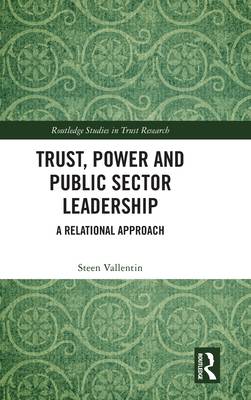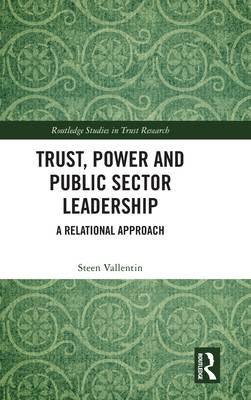
Je cadeautjes zeker op tijd in huis hebben voor de feestdagen? Kom langs in onze winkels en vind het perfecte geschenk!
- Afhalen na 1 uur in een winkel met voorraad
- Gratis thuislevering in België vanaf € 30
- Ruim aanbod met 7 miljoen producten
Je cadeautjes zeker op tijd in huis hebben voor de feestdagen? Kom langs in onze winkels en vind het perfecte geschenk!
- Afhalen na 1 uur in een winkel met voorraad
- Gratis thuislevering in België vanaf € 30
- Ruim aanbod met 7 miljoen producten
Zoeken
€ 259,45
+ 518 punten
Omschrijving
Trust, Power and Public Sector Leadership: A Relational Approach provides a critical theoretical treatment of trust in the realm of public management and governance. The public trust agenda is an antidote to rampant bureaucratic control and, in particular, the marketization and instrumentalization associated with New Public Management. The book approaches trust from a relational perspective that draws on insights from trust research, modern sociology and organization and management theory, while lending support to developments in New Public Governance. It provides a theoretical framework that distinguishes between institutional, economic, moral and relational trust and shows how a relational perspective is able to incorporate insights from the other paradigms in an inclusive approach to trust processes. Apart from providing a theoretical reading of the workings of trust in public organizations, the book addresses how trust relates to power and control along with notions of debureaucratization, post-bureaucratic organization and post-heroic leadership. It also shows how the trust agenda, in theory and practice, is related to social capital and thus efforts to strengthen social relations and collaboration in and around public organizations. Speaking of practice, the book takes its empirical point of departure in the Danish public sector. However, the aim of the book is not to promote the High trust Danish case as a benchmark or best practice. The aim is to theorize and help make sense of this particular experience by applying general theory to it and extracting general insights - with broader application - from its particular manifestations and outcomes. There is a need for more elaborate theorizing about trust and power in a public sector setting, and the Danish experience is useful as a starting point for this ambition.
Specificaties
Betrokkenen
- Auteur(s):
- Uitgeverij:
Inhoud
- Aantal bladzijden:
- 10
- Taal:
- Engels
- Reeks:
Eigenschappen
- Productcode (EAN):
- 9781138364820
- Verschijningsdatum:
- 14/10/2022
- Uitvoering:
- Hardcover
- Formaat:
- Genaaid
- Afmetingen:
- 152 mm x 229 mm
- Gewicht:
- 381 g

Alleen bij Standaard Boekhandel
+ 518 punten op je klantenkaart van Standaard Boekhandel
Beoordelingen
We publiceren alleen reviews die voldoen aan de voorwaarden voor reviews. Bekijk onze voorwaarden voor reviews.









